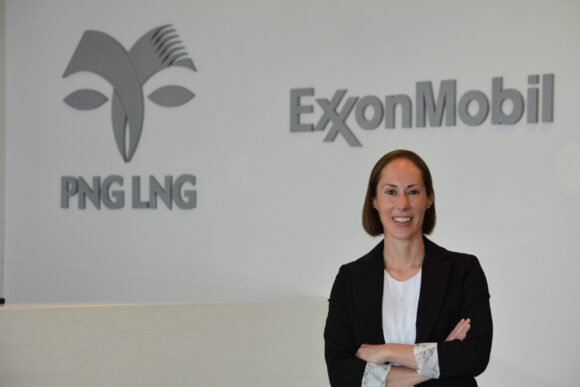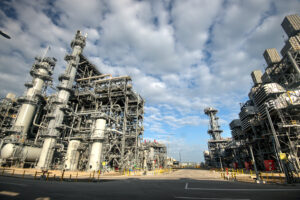A decade on from the opening of PNG LNG, Papua New Guinea’s first gas project, ExxonMobil PNG’s Chairperson and Managing Director Tera Shandro reflects on the progress so far and the potential of forthcoming projects such as the K5 billion Angore project and the Wildebeest prospect.

ExxonMobil PNG’s Tera Shandro. Credit: ExxonMobil PNG
As the single largest business investment in the country, the ExxonMobil-operated PNG LNG project has not only helped forge a new industry that directly and indirectly employs thousands of Papua New Guineans; it has also provided valuable insights into how resource development companies can partner with the country to unlock the possibilities of tomorrow.
Since achieving first gas in 2014, the PNG LNG Project has withstood challenges surrounding market downturns, the devastating 2018 Highlands earthquake, and the global COVID-19 pandemic to build a resilient, industry-leading reputation.
“If successful, Wildebeest has the potential to expand the development window for LNG in the country to 13 years of continuous construction activity.”
PNG LNG routinely produces well above its nameplate, is among the industry’s leaders in energy emissions intensity, and has achieved over 100 million hours of work to deliver more than K24 billion back to the state and its landowners through various tax and royalty streams.
ExxonMobil’s partnership mindset has seen more than K15 billion spent with Papua New Guinean businesses, while a further K1 billion has been invested into strategic community programs that are building the capacity of individuals and community institutions.
Angore Project

ExxonMobil’s LNG Plant at Caution Bay. Credit: ExxonMobil
Part of the original PNG LNG development plan, the Angore Project’s wells and pipeline represent K5 billion of new investment. Leveraging the existing infrastructure footprint, the Angore resource will be developed and connected to the Hides Gas Conditioning Plant in Hela Province.
As Papua New Guinea’s only significant gas development currently under construction, it is expected to bring on additional gas volumes later this year to supplement the existing PNG LNG gas production.
Using PNG LNG as the guide – combined with growing regional natural gas demand – Papua LNG is primed to build on its success to unlock more direct and indirect benefits for PNG. Currently, ExxonMobil is working alongside its project partners to ensure all key stakeholders are engaged and regulatory permitting is awarded.
Our team is progressing plans to expand infrastructure at our Caution Bay Plant to support the almost 6 million tonnes of gas to be processed per year.
Between the PNG LNG Project marking a decade of production, the start-up of the Angore Project and the Papua LNG project, 2024 is already shaping up to be another defining year. At the same time, teams continue to focus on P’nyang LNG and working with the government to advance other exciting potential developments such as the Wildebeest prospect.
If successful, Wildebeest has the potential to expand the development window for LNG in the country to 13 years of continuous construction activity.
Tera Sandro is the Chairperson and Managing Director of ExxonMobil PNG. This article was first published in the 2024 annual edition of Business Advantage Papua New Guinea.









Speak Your Mind